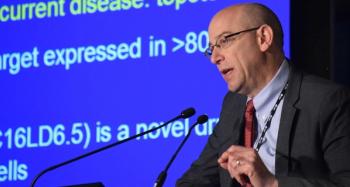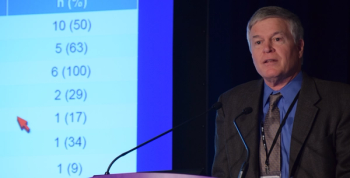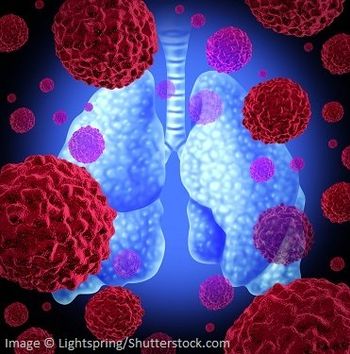
The FGFR inhibitor dovitinib showed modest efficacy in a phase II trial of patients with pretreated, advanced squamous cell lung cancer with FGFR1 amplification

Your AI-Trained Oncology Knowledge Connection!


The FGFR inhibitor dovitinib showed modest efficacy in a phase II trial of patients with pretreated, advanced squamous cell lung cancer with FGFR1 amplification

Inflammatory arthritis and sicca syndrome appear to be immune-related adverse events among some patients undergoing cancer treatment with the immune checkpoint inhibitors nivolumab and ipilimumab.

The use of hemithoracic pleural IMRT after chemotherapy could become part of a new lung-sparing therapy in patients with malignant pleural mesothelioma.

Molecular imaging of tumor glucose metabolism might be a prognostic biomarker of NSCLC responses to the investigational immunotherapy agent atezolizumab.

An emerging field in medicine, salivary diagnostics, may be the next step in detecting treatable cancer mutations in lung cancer.

Alectinib yielded significantly prolonged progression-free survival compared with crizotinib in ALK-positive NSCLC patients, according to results of a Japanese open-label trial.

Patients with relapsed small cell lung cancer now have more options according to study results first presented at the 2016 ASCO Annual Meeting, held June 3–7, 2016, in Chicago.

An antibody-drug conjugate, rovalpituzumab tesirine, shows promising efficacy against recurrent small-cell lung cancer.

A targeted-sequencing gene panel that includes EGFR, KRAS, PIK3CA, and other mutations from circulating tumor DNA detects stage I non–small-cell lung cancer and might outperform existing tumor markers.

Matching targeted therapies to genetic abnormalities harbored by tumor types for which those therapies are not approved by the FDA might expand treatment options for some patients with advanced cancers.

The FDA has approved the cobas® EGFR Mutation Test v2, the first “liquid biopsy” blood test for detecting EGFR gene mutations in non-small cell lung cancer.

The UK Lung Cancer Screening Trial found that a low-dose CT screening program targeting high-risk individuals can find lung cancer at early stages.

British researchers have validated an IHC screening tool for more quickly and inexpensively identifying patients who should undergo crizotinib therapy for lung cancer, than is currently possible with standard FISH screening.

Using a risk-based model for CT lung cancer screening could prevent more deaths and reduce false positives compared with the USPSTF recommendations.

Afatinib resulted in improved progression-free survival compared with gefitinib in treatment-naive non–small-cell lung cancer patients with EGFR mutations.

First-line osimertinib, a targeted therapy against EGFR mutations, was found to be effective in patients with advanced non–small-cell lung cancer, resulting in a 77% overall response rate.

NEW ORLEANS – A new type of antibody-drug conjugate (ADC) platform may pave the way to help patients with ovarian cancer and non-small cell lung cancer.

Three commercial tests that measure levels of PD-L1 on tumors showed similar results on non-small cell lung cancer (NSCLC) tumor samples.

New data indicates that entrectinib has clinical activity in patients with a variety of cancers with gene alterations in NTRK1/2/3, ROS1, or ALK who had never been treated with targeted agents.

In this interview, Mark Burkard, MD, PhD, discusses the Molecular Tumor Board program at the University of Wisconsin Carbone Cancer Center and the impact it's making for advanced cancer patients.

The most important marker to test is epidermal growth factor receptor (EGFR). EGFR is the second most common oncogenic driver in lung cancer, present in 15% of adenocarcinoma cases, but the most common mutation to be actionable with an approved drug.

Droplet digital polymerase chain reaction–based plasma genotyping exhibited perfect specificity in identifying EGFR and KRAS mutations in patients with advanced non–small-cell lung cancer.

First-line crizotinib therapy offered better intracranial disease control rate than chemotherapy in patients with ALK-positive non–small-cell lung cancer (NSCLC) and stable treated brain metastases.

Histone deacetylase (HDAC) inhibitors like romidepsin might improve the efficacy of programmed cell death-1 (PD-1) blockade in lung cancer.

The Cancer Research Network of Nebraska has initiated a phase II clinical trial of the autologous dendritic cell immunotherapy AGS-003 with standard platinum-doublet chemotherapy for non-small cell lung cancer.